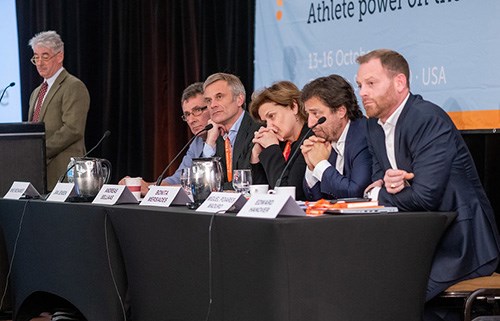FIFA governance under renewed assault
The former chairman of FIFA’s Governance and Review Committee, Miguel Poiares Maduro, came with a stark warning in his presentation at Play the Game 2019.
“A campaign costs at least £2 million to be president, even if you don’t buy votes,” said Professor Miguel Polares Maduro, who was at FIFA from June 2016 to May 2017.
“It’s not possible to be president of FIFA without spending a few millions and we don’t know where that money comes from.”
Lack of transparency and the ongoing governance crisis at world football’s governing body came under heavy fire from an experienced group of panellists at Play the Game.
Professor Maduro led the charge, insisting that FIFA cannot reform itself due to its culture. “FIFA is dominated by two fundamental problems,” he said. “It is dominated by a political cartel with a high concentration of power and there is no effective independent scrutiny. These two reasons are why FIFA cannot reform itself.”
Professor Maduro from the School of Transnational Governance at the European University Institute gave a number of examples, such as elections involving single candidates.
He explained: “Even with a single candidate, you still need a 50% majority but there could be 50% abstentions. They don’t follow this because it allows them to install members of the political cartel.
“What explains this political cartel is that it’s a closed constituency. What you need to change is the electoral body.”
During his brief tenure, Maduro said that his committee did prevent some unsuitable people getting positions, but he worried that what was achieved was being undone.
Giving an example, he said: “The rule that confederations must elect at least one woman was turned on its head so now confederations cannot elect any more than one woman.”
Infantino was the “fruit from the same tree” as his two predecessors as FIFA president, Joao Havelange and Sepp Blatter, said Maduro.
Old or new FIFA?
Infantino was also the “instrument of dubious interests” said Jan Jensen from Danish newspaper Ekstra Bladet, who, in a joint presentation with Norwegian freelance journalist Andreas Selliaas, looked at the changes in FIFA’s culture and the shift from whitewashing to football washing.
Selliaas said: “The old FIFA was a ‘decentraliser’ with a president who knew about corruption, but tolerated it as long as it was good for him. The new FIFA is more centralised and hands on over who is going to be elected.”
As an example, Selliaas gave FIFA’s installing Fatma Samoura to run the Confederation of African Football directly for the world body, which he described as “unbelievable”. He added: “In football, there are only white elephants and paper tigers.”
The role of football’s political elite was also the subject of a passionate address by Australian activist and whistleblower Bonita Mersiades, who asked what changes there really had been at FIFA.
“When one person departs, another person simply takes over their role,” said Mersiades, who illustrated this by pointing out the succession of indictments placed on senior figures and their replacements in countries and regions such as Brazil, CONCACAF and Oceania.
Any changes were “more about sizzle than substance and the process rather than the culture,” said Mersiades, who added: “FIFA sets the standard at the lowest common denominator as its suits their business. It’s truly a case of the more things change, the more they stay the same.”
Balance to the assault on FIFA was provided by the world federation’s former chief compliance officer, Edward Hanover, who explained how some reforms had been pushed through on a financial level.
The world body distributes $450m a year and the reforms were aimed at introducing compliance systems that tracked money in and out of FIFA.
“We began to audit every year and it was a shock to some of the member associations, but we wanted the organisations to understand how they are spending their money,” said Hanover. “My goal was to limit the own goals.”
FIFA was a “highly political organisation” admitted Hanover, but he added: “Not once in three years was I told don’t look into that. I know people will be surprised by that but that was my experience.”
While some candidates on the panel suggested replacing FIFA with a new world body might be preferable, Hanover said: “If you are going to wait for something to completely start again, you will be waiting a long time.”
Instead, changes to FIFA must come from outside concluded Maduro, who said: “Any attempts to reform FIFA cannot come from within. No cartel opens itself up to competition by definition.”
“Change needs to come from outside and will not come from a state. Any time FIFA is challenged by a state, they can take their revenge by excluding their national teams.”
“There needs to be a transnational effort led by the courts.”
Whether this will materialise before the next Play the Game in 2021 or at all remains to be seen.
In more than 40 sessions, over 170 speakers will present their thoughts and oponions on a wide range of the most topical questions in world sport during the 11th Play the Game conference, taking place in Colorado Springs, USA, 13-16 October 2019.







